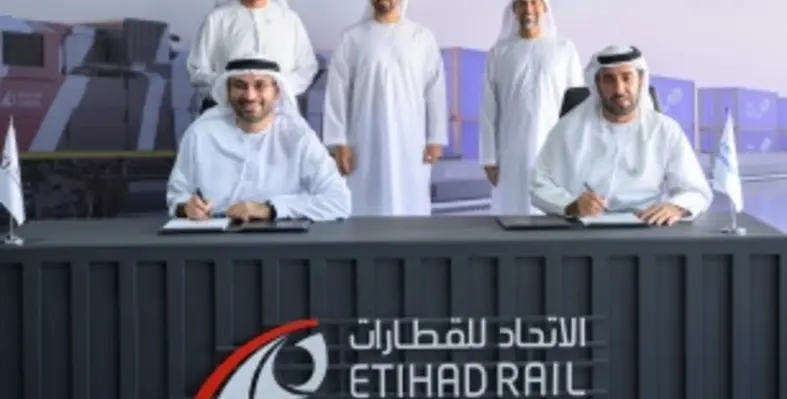Theyab bin Mohamed bin Zayed Al Nahyan, chairman of the Abu Dhabi Crown Princes Court as well as the Etihad Rail, witnessed the signing of the terms sheet for a strategic partnership for sustainable transportation between Etihad Rail, the developer of the UAE Railway Network and Borouge, a petrochemical company that provides innovative and differentiated polyolefin solutions, to transport 1.3 mn tons of Borouge’s polyolefins annually from its petrochemical complex in Al Ruways Industrial City via rail for export to customers
Sultan Ahmed Al Jaber, Minister of Industry and Advanced Technology, managing director and CEO of the Abu Dhabi National Oil Company (ADNOC), and the chairman of Borouge, and Suhail Mohamed Al Mazrouei, Minister of Energy and Infrastructure, witnessed the signing as well.
The agreement was signed by Shadi Malak, CEO of Etihad Rail, and Hazeem Sultan Al Suwaidi, CEO of Borouge, in the presence of members of Etihad Rail and Borouge’s board of directors.
Al Nahyan said, “This strategic partnership comes in line with Etihad Rail's efforts to provide logistics solutions to some of the country’s largest companies, where they can transport goods through the rail network at reduced costs and time. In doing so, Etihad Rail also contributes to reducing carbon emissions, in line with the objectives of the UAE.” He highlighted the role of ADNOC in supporting railway projects, as it was the first to use Etihad Rail’s services to transport granulated sulfur across the UAE. In addition, he also highlighted Borouge's innovative capabilities in developing advanced solutions that enhance the UAE's competitiveness in the petrochemical industry and support the UAE's economy diversification efforts.
Al Jaber said, “This important collaboration between Borouge and Etihad Rail contributes to the growth of Abu Dhabi’s industrial sector and will support Borouge’s ongoing drive to optimize its logistics platform, lowering both its operating costs and carbon emissions.
“The partnership reinforces Borouge’s resilience and accelerates the export of its ‘Made In UAE’ products using more sustainable modes of transport, while underlining the partners’ commitment to the UAE’s Net Zero by 2050 Strategic Initiative."
This partnership supports the national In-Country Value programme, with 88% of the value flowing back into the local economy, boosting economic diversification and growth.
Under the terms of this partnership, Borouge becomes one of Etihad Rail’s main customers. It also includes the development of a rail freight terminal in Al Ruways Industrial City, extending over an area of more than one mn sq m, where the terminal will handle loading and unloading, as well as storage and maintenance of shipping containers. By using rail, the time required to transport Borouge’s products will be reduced to four hours compared to 12 hours via other modes of transport.
Strategic meeting with representatives of the private sector to discuss ways to benefit from Etihad Rail’s freight services
Following the signing of the strategic partnership, Al Nahyan chaired a meeting with representatives of private companies in the rail industry, which was dedicated to discussing the commercial opportunities provided by the UAE National Rail Network to the private sector. The meeting also covered the different ways to benefit from Etihad Rail’s freight services to support the development of an integrated transport system, which provides services at low costs and with high levels of security, efficiency, reliability, and sustainability.
The signing of partnership and the meeting with private companies came during a tour by Al Nahyan to the ICAD rail freight terminal, to oversee its progress. It is the largest rail freight terminal in the UAE, built over an area of more than 2.7 mn sq ft, and its various facilities, which include more than 22 buildings to support operations.







